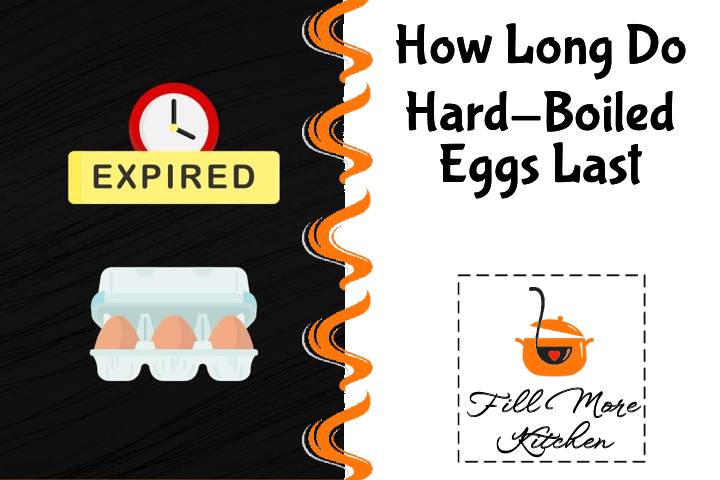Hard-boiled eggs are a convenient and healthy snack that provides a high amount of protein, which can help you feel full and energized for longer periods. It’s a popular choice among households due to its affordability and easy accessibility in the refrigerator.
Assuming that hard-boiled eggs are stored correctly, they can last for 5-7 days, depending on the freshness of the eggs before boiling and whether they are kept in a tightly sealed container in the refrigerator; it is recommended to store unpeeled eggs to avoid absorbing unwanted smells.
When storing hard-boiled eggs, it is important to consider factors such as identifying spoilage and preventing premature spoilage, which can ultimately result in time and money savings.
How Should Hard-Boiled Eggs Be Stored?
If you want your hard-boiled eggs to last longer, it is recommended to store them in a covered container in the refrigerator after boiling.
The best method to keep hard-boiled eggs fresh is by storing them properly. When left at room temperature, they can spoil rapidly, and no one wants to eat a foul-smelling egg that appears unappetizing and may contain harmful bacteria.
If your hard-boiled eggs have excess moisture after peeling, you can address this issue by putting a layer of paper towel in the container and placing the eggs on it. If needed, you can also add another layer of paper towel over the eggs.
By absorbing any excess moisture, the paper towels prevent the hard-boiled eggs from becoming damp and thus maintain their optimal freshness for an extended duration.
If you have peeled hard-boiled eggs to store, you can keep them in a bowl of fresh water and change the water every day without covering the container.
It is recommended to consume the hard-boiled eggs within a few days of peeling them since they are not as durable as unpeeled eggs due to the absence of the outer shell.
How Can You Tell If a Hard-Boiled Egg Has Gone Bad?
While cooking, hard-boiled eggs may emit a gas that has an unpleasant odor to some people, but this does not indicate spoilage of the nutritious snack.
In addition to relying on your sense of smell to detect any unpleasant odors, which is easier if you regularly eat hard-boiled eggs, it’s also important to use your other senses. If you notice any discoloration or areas with mold, it’s best to discard the egg and begin with a new one.
If you are aware that hard-boiled eggs have been refrigerated for more than a week, it is advisable to be careful as they may have exceeded their best-by date, and it would be better to begin with a fresh batch.
After boiling and cooling the eggs with an ice bath, it is recommended to refrigerate them within two hours to prevent the risk of consuming a spoiled egg caused by quick bacterial growth if left on the countertop beyond that time.
If you observe a slimy film on the outer layer of a hard-boiled egg that has gone bad, it is advisable to discard it even if it doesn’t smell bad because this indicates that the egg has exceeded its optimal freshness and consuming it may lead to illness.
While the yolk may occasionally have a green or gray hue due to excessive boiling, this coloration should not spread to the egg white; if it does, it indicates spoilage and necessitates disposal.
What Can Happen If You Eat a Boiled Egg That’s Gone Bad?
Consuming hard-boiled eggs that have gone bad can lead to a food-borne illness, causing symptoms such as diarrhea, nausea, and vomiting.
If you have experienced a food illness before, you are likely to be cautious about consuming questionable food. When in doubt about the safety of your hard-boiled eggs, it is advisable to discard them and prepare a fresh batch.
Fortunately, the probability of falling seriously ill and requiring hospitalization due to the consumption of a spoiled hard-boiled egg is low.
Usually, the treatment plan includes consuming additional fluids, taking some rest, and following a mild diet for a few days until the feeling of nausea subsides.
If you consume hard-boiled eggs frequently, you can easily differentiate the specific smell of spoiled ones from the regular egg smell, and once you detect this odor, it’s time to dispose of them.
Consuming a spoiled hard-boiled egg can lead to symptoms that may manifest within 6-48 hours after ingestion.
If you consume a spoiled egg in a dish like egg salad, it can be camouflaged by other components, and you may not realize it until you start experiencing illness.
Do Hard-Boiled Eggs Last Longer Peeled or Unpeeled?
Hard-boiled eggs should be stored unpeeled to maintain the layer of protection provided by the shell, which helps prevent moisture and fridge odors from affecting them.
Parents who are short on time and want to give their children a fast and effortless snack may consider keeping hard-boiled eggs unpeeled as the most suitable alternative.
Nevertheless, allowing your child to remove the shell before consuming them is the optimal approach to guarantee the hard-boiled eggs remain fresh.
It may be unexpected, but refrigerated hard-boiled eggs can become simpler to peel.
If you find it difficult to remove the shell of your hard-boiled eggs after immersing them in an ice bath, it might be helpful to refrigerate them for a day or more before trying to peel them.
It is recommended to label the container when storing hard-boiled eggs, whether they are peeled or unpeeled, so that you can keep track of how long they have been stored in the refrigerator.
By doing so, the chances of accidentally consuming a rotten hard-boiled egg and experiencing its unpleasant flavor and odor are reduced.
Can You Freeze Hard-Boiled Eggs?
Hard-boiled eggs do not freeze well, so it is best to avoid freezing them. If you do not plan on consuming or sharing your hard-boiled eggs immediately, it is recommended to delay cooking them until you are ready to eat or distribute them.
Although it is possible to freeze hard-boiled eggs, their whites may turn tough and rubbery, while the yolks can become dehydrated and have a powdery consistency, making them unappetizing. Therefore, it is recommended to refrain from freezing hard-boiled eggs.
Fortunately, there are numerous dishes that require hard-boiled eggs, such as deviled eggs, egg salad sandwiches, and various green salads that utilize sliced boiled eggs as a garnish.
There are alternative ways to utilize hard-boiled eggs without having to rely on freezing them.
If you plan to freeze your eggs, the most effective way is to mix the yolks and whites together before putting them in the freezer. According to FDA guidelines, it is best to use frozen eggs within one year.
Can You Reheat Hard-Boiled Eggs?
Typically, hard-boiled eggs are consumed cold, but if you want to warm them up, there are some precautions you should take to prevent any microwave accidents or the eggs from becoming tough.
When microwaving a hard-boiled egg, it is important to take off the shell to prevent any potential mess in the appliance that may require thorough cleaning to avoid lingering odors.
If you want to reheat several hard-boiled eggs at the same time, the recommended approach is to put them in a bowl with their shells on and pour boiling water over them. After letting them sit for 8-10 minutes, you can take them out and start peeling and consuming them.
Reheated eggs experience a decrease in their protein content, making them less nutritious than when they were fresh, especially if they are reheated multiple times. If you decide to reheat them, it is recommended to do so only once and consume them immediately.
You can also check this video about “How Long Do Hard-Boiled Eggs Last?”
Check out our top 10 reviews!
Related posts
https://fillmorekitchen.com/how-to-reheat-a-chipotle-bowl/
https://fillmorekitchen.com/is-it-bad-to-run-a-dishwasher-every-day/
https://fillmorekitchen.com/what-kind-of-pans-can-go-in-a-toaster-oven/
https://fillmorekitchen.com/can-you-leave-half-half-out-overnight/
https://fillmorekitchen.com/is-it-worth-having-a-dishwasher-for-one-person/



